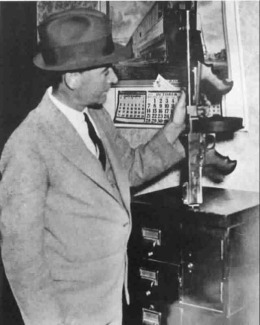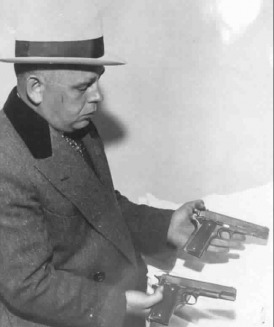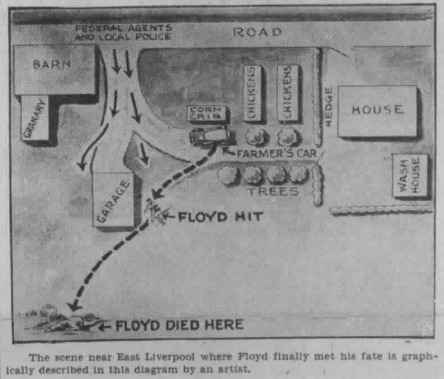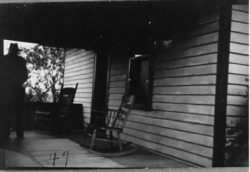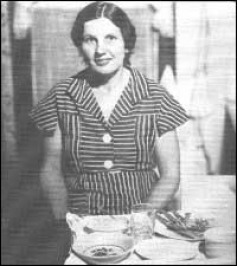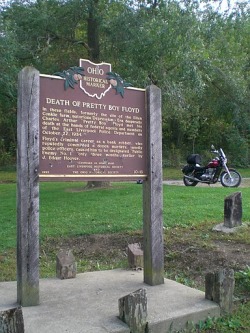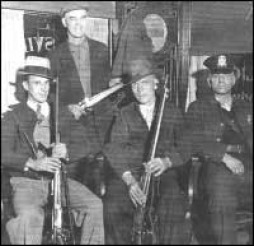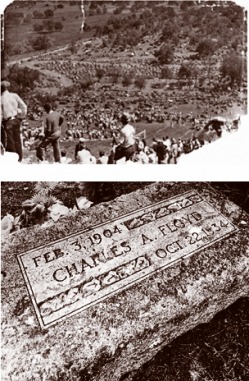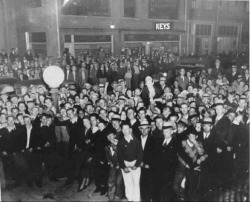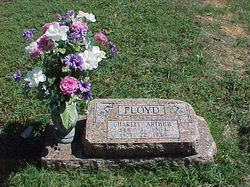8 miles and a sandwich
Here come the Feds
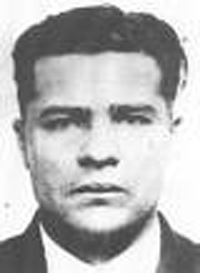
Charles Arthur Floyd
Melvin Purvis, head of the Chicago office, and three other agents, including Herman E. Hollis (both Purvis and Hollis had been in on the John Dillinger killing in Chicago the previous July) were immediately dispatched to Wellsville by private plane. (Hollis and Purvis happened to be in Cincinnati working on an unrelated kidnapping when the call came in.) They were met at the airstrip by Long who briefed them on the events of the previous 24 hours.
Purvis set up headquarters at the Traveler’s Inn in Wellsville, and more agents began pouring in from Detroit, Cleveland, Pittsburgh, Louisville, Cincinnati, New York, Chicago and Indianapolis. Roadblocks were set up everywhere. Police officers from nearly every town in Eastern Ohio were assigned to the Floyd search, and known underworld "safe houses" in Akron, Cleveland, Medina and Youngstown were put under watch. Public alerts were broadcast to area residents, and newspapers rushed out special editions. By nightfall on Sunday, Eastern Ohio had effectively been shut down.
The following morning, Chicago FBI Special Agent Samuel P. Cowley, who had also been in on the Dillinger killing, arrived to aid in the search. (In less than five weeks, both Cowley and Hollis would be dead at the hands of Baby Face Nelson who, in turn, would be killed by them.)
The search for Floyd resumed at daybreak on Monday, Oct. 22. Floyd had less than 10 hours to live.
FBI squads, divided into groups of three or four, patrolled the roadways. The armed locals searched the woods and farms in smaller and smaller circles. Purvis remained at the Traveler’s Inn to coordinate phones reports ... and stay in constant communication with J. Edgar Hoover, who kept insisting Floyd not be allowed to escape. All tips, rumors and reported sightings of Floyd were checked out immediately, and even the home of Richetti relatives in Dillonvale, Ohio, was raided ... and kept under watch.
By mid-day, Purvis, by now under extreme pressure from Hoover, joined the physical search. He, with agents D.K. Hall, W.E. Hopton and S.K. McKee, happened upon four East Liverpool policeman, Chief Hugh J. McDermott, Herman H. Roth, Chester C. Smith and Glenn G. Montgomery. They decided to joins forces since the locals knew the area, and the feds had good tips on Floyd sightings. The two cars, with the East Liverpool car in front, began driving the roads, stopping at every farm.
They searched barns, root cellars, storage sheds and several abandoned structures. At one farmhouse, they took a brief rest and ate fresh fruit, while considering their next move. Purvis would later write in his autobiography, "American Agent," that he was losing hope of finding Floyd. He knew that with darkness rapidly approaching, Floyd would have another 12 hours to get away ... if he wasn’t already in another state. As the afternoon shadows grew longer, they moved on to the next farmhouse.
Purvis would have been shocked to learn that Floyd was, in fact, less that three miles away having a late lunch.
(STORY CONTINUES BELOW PICTURES)
Purvis set up headquarters at the Traveler’s Inn in Wellsville, and more agents began pouring in from Detroit, Cleveland, Pittsburgh, Louisville, Cincinnati, New York, Chicago and Indianapolis. Roadblocks were set up everywhere. Police officers from nearly every town in Eastern Ohio were assigned to the Floyd search, and known underworld "safe houses" in Akron, Cleveland, Medina and Youngstown were put under watch. Public alerts were broadcast to area residents, and newspapers rushed out special editions. By nightfall on Sunday, Eastern Ohio had effectively been shut down.
The following morning, Chicago FBI Special Agent Samuel P. Cowley, who had also been in on the Dillinger killing, arrived to aid in the search. (In less than five weeks, both Cowley and Hollis would be dead at the hands of Baby Face Nelson who, in turn, would be killed by them.)
The search for Floyd resumed at daybreak on Monday, Oct. 22. Floyd had less than 10 hours to live.
FBI squads, divided into groups of three or four, patrolled the roadways. The armed locals searched the woods and farms in smaller and smaller circles. Purvis remained at the Traveler’s Inn to coordinate phones reports ... and stay in constant communication with J. Edgar Hoover, who kept insisting Floyd not be allowed to escape. All tips, rumors and reported sightings of Floyd were checked out immediately, and even the home of Richetti relatives in Dillonvale, Ohio, was raided ... and kept under watch.
By mid-day, Purvis, by now under extreme pressure from Hoover, joined the physical search. He, with agents D.K. Hall, W.E. Hopton and S.K. McKee, happened upon four East Liverpool policeman, Chief Hugh J. McDermott, Herman H. Roth, Chester C. Smith and Glenn G. Montgomery. They decided to joins forces since the locals knew the area, and the feds had good tips on Floyd sightings. The two cars, with the East Liverpool car in front, began driving the roads, stopping at every farm.
They searched barns, root cellars, storage sheds and several abandoned structures. At one farmhouse, they took a brief rest and ate fresh fruit, while considering their next move. Purvis would later write in his autobiography, "American Agent," that he was losing hope of finding Floyd. He knew that with darkness rapidly approaching, Floyd would have another 12 hours to get away ... if he wasn’t already in another state. As the afternoon shadows grew longer, they moved on to the next farmhouse.
Purvis would have been shocked to learn that Floyd was, in fact, less that three miles away having a late lunch.
(STORY CONTINUES BELOW PICTURES)
'Who in hell tipped you?'
A Meal 'Fit for a king'
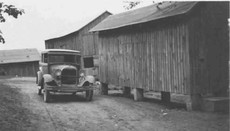
Dyke's car parked at the corncrib
At about 10 that morning, farmer Arthur Conkle, whose farm was near that of his widowed sister-in-law, Ellen Conkle, briefly saw a man running in his corn field. He noticed him again about noon in the field of his neighbor, Robert Robinson.
At about 12:30, Floyd approached Robinson and explained he was lost and hungry and offer to pay for some food. In 48 hours, Floyd had only traveled eight miles from where his car had broken down. Robinson later testified the stranger was in need of a shave, and was dressed in a navy blue suit with a very dirty and torn white silk shirt open at the collar. He said the man’s hands were red and heavily scratched and, although polite, he appeared nervous.
As Robinson’s daughter prepared a sandwich, Floyd asked if Robinson would drive him to Youngstown. Robinson refused, and Floyd then asked for directions. Robinson said Floyd thanked him and was last seen walking north along the highway.
Floyd had just under four hours to live.
Just before 3 p.m., the widow Ellen Conkle was working in the smokehouse of her Spruceville Road farm, about two miles south of Clarkson and seven miles northeast of East Liverpool. Her brother and sister-in-law, Stewart L. and Mary Dyke, were working in the corn field. A stranger approached her and said he was lost, hungry and tired, and could he pay her for some food. He had only eaten a tomato sandwich, and some apples, pears and late season blueberries in two days. "Just meat and bread," he told her. Mrs. Conkle, who rarely read the newspapers, had no idea who Floyd was, or of the massive manhunt happening around her.
He said he and his brother had been out hunting "squirrels or rabbits or anything" the night before, and had become separated and lost in the darkness. She didn’t believe him. "You don’t hunt squirrels at night," she said.
"To tell the truth lady, I got drunk last night and I don’t know where I am exactly," he said. She didn’t believe that story either, but agreed to make him some food, and told him to go outside and wait. Standing in front of the house, Floyd had a sweeping view in all directions. She said he keep looking around, but appeared calm.
When dinner was ready he came inside, washed, and asked for matches and any newspapers she had as he quickly ate his meal of pork chops, potatoes and rice, with doughnuts, pumpkin pie and coffee for dessert. He read stories about the bank robbery in Tiltonsville, about the encounter in the woods on Saturday and the arrival of more than two dozen federal agents the day before. He could not have been happy with his grim prospects, but Youngstown was still nearby, and that meant safety. He just needed to get there.
While eating, he asked for directions to Youngstown, and about a car parked next to her corncrib. She explained it was her brother’s, and he was working in the field.
Would he drive Floyd to Youngstown?
She said he might take him part way, but he first had to finish his field work. Floyd must have smiled. Finally, a possible escape.
After thanking her and telling her the meal had been "fit for a king," he gave her a dollar, and said he would wait in the car. "I look like a wild man, don’t I?," he joked, as he walked outside. "I feel just that way."
Floyd had less than an hour to live.
At about 4 p.m., Mrs. Conkle’s brother and sister-in-law came in from the field, and Dyke approached Floyd, who was still sitting in the car.
"I’m lost. You sister tells me you might drive me to the bus line." Dyke asked which one, and Floyd said it didn’t matter, as long as it was a bus line. When Dyke refused, Floyd said, "Then take me to (highway) Number Seven." Again Dyke refused, but finally agreed to take Floyd as far as Clarkson, and Floyd said that would be fine.
Dyke later said Floyd’s clothing was covered in Spanish needles, and he even remarked to Floyd "Well, one thing is for sure, there are no Spanish needles left where you have been." Floyd laughed, and said, "Yes, I guess I look a picture."
Dyke and his wife were both uneasy about the stranger, but Dyke agreed to drive him because he wanted to get him away from his sister’s farm quickly. He said as they were about to leave, Floyd walked to the road and looked both directions before he came back and got into the car. As Dyke was backing out, however, his wife remarked about two cars rapidly approaching.
Dyke said Floyd went pale, pulled out a gun and ordered him to drive over behind the corncrib. where the car had originally been parked. "They are looking for me," he said.
Dyke pulled up to the corncrib and Floyd jumped out. At first, he started to crawl under the crib, about a foot off the ground, but quickly came back out and looked toward the woods, about 200 yards away, just as the two cars pulled into the driveway.
Officer Glenn Montgomery was the first out the car and shouted, "There he is, back of the corncrib." The agents piled out of their car, and someone called "Halt, or we’ll shoot" and "Floyd, come to the road. If you don’t, we will shoot." McDermott shouted, "Look out. He’s going to run."
Floyd ran behind a small garage near the corncrib, and then came out into the open running in a zig-zag motion across the cornfield that had many dips and corn stocks. He had a .45 in his right hand and kept looking over his right shoulder, but never fired at the officers, who were less than 200 feet away. Both McDermott and Purvis shouted "Let him have it."
The eight men fired more than 50 rounds from machine guns, shotguns, pistols and rifles toward Floyd. Mrs. Dyke said she could hear the bullets whistling in the air, and saw tree branches and mounds of dirt flying everywhere.
Floyd continued a few more feet before his right armed jerked forward as a bullet struck his forearm. A .45 slug entered just below his left shoulder and lodged in his rib cage, shattering his eighth rib and taking part of his lung. Another .45 entered on the right and stopped just below his heart. The slugs, according to the coroner, had crisscrossed in his chest and both nicked his heart. Floyd managed to just make it over a small incline and then fell onto his face. He rose to his knees, but fell again and rolled onto his back. As the police ran toward him, Floyd tried to fire his .45, but could not because of his injured arm. Purvis was the first to reach him, and kicked the gun from his hand. Floyd attempted to reach with his left hand to get the second gun in his belt, but Montgomery grabbed that hand and Roth grabbed the weapon from Floyd’s belt. Floyd seemed to keep trying to get up, but fell back each time. Montgomery asked him what his name was, and Floyd said "Murphy." Again he was asked, and again he said "Murphy."
"Are you Pretty Boy Floyd?" Purvis asked, as he handcuffed the dying man. (A bit of an overreaction?).
"I’m Charles Arthur Floyd," he answered. (He hated the nickname "Pretty Boy.") Montgomery also asked if he was Floyd. "Yes. That’s my name. I’m Floyd."
Again, someone asked, "Your name’s Floyd?" Floyd seemed to half smile as blood begin pouring from his mouth. "I am Floyd. Yes, Floyd. Floyd."
Purvis, along with Stewart Dyke and Agent Hall, immediately left to find a phone and get an ambulance. (Purvis' first call, however, was to Hoover to report Floyd was in custody.) Once they had gone, Officers Smith, Roth and Montgomery carried Floyd to the shade of a nearby apple tree. They asked him repeatedly about the Kansas City Massacre and other crimes, but each time Floyd answered with profanities. "I won’t tell you anything. To hell with the Union Station (scene of the massacre)."
McDermott, probably feeling the need to say something, asked, "How bad are you hurt?" Floyd stared at him, blood still coming from his mouth. "I am done. You got me twice." He then looked to Montgomery. "Where’s Ad?" (Referring to Adam Richetti). "I don’t know," said Mongomery, and Floyd said "Oh hell. Where’s Eddie?" and then, struggling onto his left elbow, "Who in hell tipped you off? I’m Floyd all right. You got me this time. I know I’m through." He then fell back. "Fuck you. Fuck you. Fuck you," he said. He remained quiet, looking up at the apple tree. A moment or two later his eyes widen and then half closed. He quietly said his last words, "I’m going."
He died at 4:25, 15 minutes after being shot. A fall breeze kicked up, and Montgomery would later remember leaves blowing up against the small group huddled under the apple tree around Floyd, still handcuffed.
A search of the body found $122 (12 tens and two ones), assorted coins, a key, matches, a loaded .45 clip, and two apples. Floyd also had a Gruen pocket watch, a silver half dollar attached to a pocket chain, and he was wearing a cameo ring on his right hand (clearly seen in the morgue photos, elsewhere on this site).
Purvis returned a short time later - without an ambulance - and the body was placed in the back of the agent’s car (in a sitting position between two deputy sheriffs) and taken to Sturgis Funeral Home in East Liverpool where it was examined and an autopsy performed. An inquest the next day ruled death by gunshot, and the shooting as justified. The body was prepared for shipping and released to people hired by Floyd's family to bring him home. Thousands attended the funeral back in Oklahoma.
But wait. That’s not the end of the story.
Why was Purvis so anxious to interview Richetti as soon as he arrived in Wellsville? Why did he give Fultz a false name when he first met him? And why had he repeatedly demanded Floyd’s machine gun, which was found in the woods the afternoon before? Why was Hoover so intent on making sure Floyd was taken? And what about Richetti and the Biard sisters? How about Baum and McMillen? And finally, what did Officer Smith admit to years after Floyd’s shooting? It’s all in "Floyd revisited."
Home Previous
At about 12:30, Floyd approached Robinson and explained he was lost and hungry and offer to pay for some food. In 48 hours, Floyd had only traveled eight miles from where his car had broken down. Robinson later testified the stranger was in need of a shave, and was dressed in a navy blue suit with a very dirty and torn white silk shirt open at the collar. He said the man’s hands were red and heavily scratched and, although polite, he appeared nervous.
As Robinson’s daughter prepared a sandwich, Floyd asked if Robinson would drive him to Youngstown. Robinson refused, and Floyd then asked for directions. Robinson said Floyd thanked him and was last seen walking north along the highway.
Floyd had just under four hours to live.
Just before 3 p.m., the widow Ellen Conkle was working in the smokehouse of her Spruceville Road farm, about two miles south of Clarkson and seven miles northeast of East Liverpool. Her brother and sister-in-law, Stewart L. and Mary Dyke, were working in the corn field. A stranger approached her and said he was lost, hungry and tired, and could he pay her for some food. He had only eaten a tomato sandwich, and some apples, pears and late season blueberries in two days. "Just meat and bread," he told her. Mrs. Conkle, who rarely read the newspapers, had no idea who Floyd was, or of the massive manhunt happening around her.
He said he and his brother had been out hunting "squirrels or rabbits or anything" the night before, and had become separated and lost in the darkness. She didn’t believe him. "You don’t hunt squirrels at night," she said.
"To tell the truth lady, I got drunk last night and I don’t know where I am exactly," he said. She didn’t believe that story either, but agreed to make him some food, and told him to go outside and wait. Standing in front of the house, Floyd had a sweeping view in all directions. She said he keep looking around, but appeared calm.
When dinner was ready he came inside, washed, and asked for matches and any newspapers she had as he quickly ate his meal of pork chops, potatoes and rice, with doughnuts, pumpkin pie and coffee for dessert. He read stories about the bank robbery in Tiltonsville, about the encounter in the woods on Saturday and the arrival of more than two dozen federal agents the day before. He could not have been happy with his grim prospects, but Youngstown was still nearby, and that meant safety. He just needed to get there.
While eating, he asked for directions to Youngstown, and about a car parked next to her corncrib. She explained it was her brother’s, and he was working in the field.
Would he drive Floyd to Youngstown?
She said he might take him part way, but he first had to finish his field work. Floyd must have smiled. Finally, a possible escape.
After thanking her and telling her the meal had been "fit for a king," he gave her a dollar, and said he would wait in the car. "I look like a wild man, don’t I?," he joked, as he walked outside. "I feel just that way."
Floyd had less than an hour to live.
At about 4 p.m., Mrs. Conkle’s brother and sister-in-law came in from the field, and Dyke approached Floyd, who was still sitting in the car.
"I’m lost. You sister tells me you might drive me to the bus line." Dyke asked which one, and Floyd said it didn’t matter, as long as it was a bus line. When Dyke refused, Floyd said, "Then take me to (highway) Number Seven." Again Dyke refused, but finally agreed to take Floyd as far as Clarkson, and Floyd said that would be fine.
Dyke later said Floyd’s clothing was covered in Spanish needles, and he even remarked to Floyd "Well, one thing is for sure, there are no Spanish needles left where you have been." Floyd laughed, and said, "Yes, I guess I look a picture."
Dyke and his wife were both uneasy about the stranger, but Dyke agreed to drive him because he wanted to get him away from his sister’s farm quickly. He said as they were about to leave, Floyd walked to the road and looked both directions before he came back and got into the car. As Dyke was backing out, however, his wife remarked about two cars rapidly approaching.
Dyke said Floyd went pale, pulled out a gun and ordered him to drive over behind the corncrib. where the car had originally been parked. "They are looking for me," he said.
Dyke pulled up to the corncrib and Floyd jumped out. At first, he started to crawl under the crib, about a foot off the ground, but quickly came back out and looked toward the woods, about 200 yards away, just as the two cars pulled into the driveway.
Officer Glenn Montgomery was the first out the car and shouted, "There he is, back of the corncrib." The agents piled out of their car, and someone called "Halt, or we’ll shoot" and "Floyd, come to the road. If you don’t, we will shoot." McDermott shouted, "Look out. He’s going to run."
Floyd ran behind a small garage near the corncrib, and then came out into the open running in a zig-zag motion across the cornfield that had many dips and corn stocks. He had a .45 in his right hand and kept looking over his right shoulder, but never fired at the officers, who were less than 200 feet away. Both McDermott and Purvis shouted "Let him have it."
The eight men fired more than 50 rounds from machine guns, shotguns, pistols and rifles toward Floyd. Mrs. Dyke said she could hear the bullets whistling in the air, and saw tree branches and mounds of dirt flying everywhere.
Floyd continued a few more feet before his right armed jerked forward as a bullet struck his forearm. A .45 slug entered just below his left shoulder and lodged in his rib cage, shattering his eighth rib and taking part of his lung. Another .45 entered on the right and stopped just below his heart. The slugs, according to the coroner, had crisscrossed in his chest and both nicked his heart. Floyd managed to just make it over a small incline and then fell onto his face. He rose to his knees, but fell again and rolled onto his back. As the police ran toward him, Floyd tried to fire his .45, but could not because of his injured arm. Purvis was the first to reach him, and kicked the gun from his hand. Floyd attempted to reach with his left hand to get the second gun in his belt, but Montgomery grabbed that hand and Roth grabbed the weapon from Floyd’s belt. Floyd seemed to keep trying to get up, but fell back each time. Montgomery asked him what his name was, and Floyd said "Murphy." Again he was asked, and again he said "Murphy."
"Are you Pretty Boy Floyd?" Purvis asked, as he handcuffed the dying man. (A bit of an overreaction?).
"I’m Charles Arthur Floyd," he answered. (He hated the nickname "Pretty Boy.") Montgomery also asked if he was Floyd. "Yes. That’s my name. I’m Floyd."
Again, someone asked, "Your name’s Floyd?" Floyd seemed to half smile as blood begin pouring from his mouth. "I am Floyd. Yes, Floyd. Floyd."
Purvis, along with Stewart Dyke and Agent Hall, immediately left to find a phone and get an ambulance. (Purvis' first call, however, was to Hoover to report Floyd was in custody.) Once they had gone, Officers Smith, Roth and Montgomery carried Floyd to the shade of a nearby apple tree. They asked him repeatedly about the Kansas City Massacre and other crimes, but each time Floyd answered with profanities. "I won’t tell you anything. To hell with the Union Station (scene of the massacre)."
McDermott, probably feeling the need to say something, asked, "How bad are you hurt?" Floyd stared at him, blood still coming from his mouth. "I am done. You got me twice." He then looked to Montgomery. "Where’s Ad?" (Referring to Adam Richetti). "I don’t know," said Mongomery, and Floyd said "Oh hell. Where’s Eddie?" and then, struggling onto his left elbow, "Who in hell tipped you off? I’m Floyd all right. You got me this time. I know I’m through." He then fell back. "Fuck you. Fuck you. Fuck you," he said. He remained quiet, looking up at the apple tree. A moment or two later his eyes widen and then half closed. He quietly said his last words, "I’m going."
He died at 4:25, 15 minutes after being shot. A fall breeze kicked up, and Montgomery would later remember leaves blowing up against the small group huddled under the apple tree around Floyd, still handcuffed.
A search of the body found $122 (12 tens and two ones), assorted coins, a key, matches, a loaded .45 clip, and two apples. Floyd also had a Gruen pocket watch, a silver half dollar attached to a pocket chain, and he was wearing a cameo ring on his right hand (clearly seen in the morgue photos, elsewhere on this site).
Purvis returned a short time later - without an ambulance - and the body was placed in the back of the agent’s car (in a sitting position between two deputy sheriffs) and taken to Sturgis Funeral Home in East Liverpool where it was examined and an autopsy performed. An inquest the next day ruled death by gunshot, and the shooting as justified. The body was prepared for shipping and released to people hired by Floyd's family to bring him home. Thousands attended the funeral back in Oklahoma.
But wait. That’s not the end of the story.
Why was Purvis so anxious to interview Richetti as soon as he arrived in Wellsville? Why did he give Fultz a false name when he first met him? And why had he repeatedly demanded Floyd’s machine gun, which was found in the woods the afternoon before? Why was Hoover so intent on making sure Floyd was taken? And what about Richetti and the Biard sisters? How about Baum and McMillen? And finally, what did Officer Smith admit to years after Floyd’s shooting? It’s all in "Floyd revisited."
Home Previous
